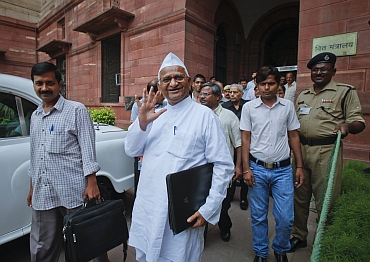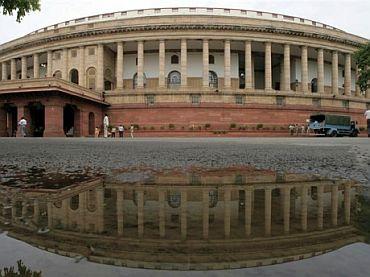 | « Back to article | Print this article |
It's the Anna effect: Awareness may grow about Parliament
Enhanced public awareness about parliamentary procedures could be one of the fringe benefits of the drama at Ramleela ground. Commercial news channels don't usually inform us about the workings of parliamentary committees. Both the Lok Sabha and state legislatures tend to be in the news when something raucous or disruptive has happened.
This might be one of the reasons why many of the agitators wearing 'I am Anna' caps claimed that they have been betrayed by politicians and elected representatives for the last 60 years. This allegation is at best ignorance and at worst it is false propaganda.
But as the dust settles and tempers cool, it is possible that more people might now have a closer interest in how laws and policies are made.
Click NEXT to read further...
Quality of debate in Parliament is generally higher than believed to be
Set up in 2005, PRS aims to 'deepen and broaden the legislative process by providing members of Parliament the information they need for debates in Parliament'. The group also aims to synthesise feedback from a range of stakeholders to provide MPs across party lines with up-to-date information.
At present, PRS is actively engaged with about 250 MPs from over 20 different political parties. According to a study by the Indian Institute of Management, Ahmedabad, in 2008, over half the MPs surveyed were aware of the work of PRS, and about a quarter said that they regularly use research material provided by it.
The quality of debate in Parliament is generally much higher than it is commonly believed to be. According to CV Madhukar, a senior member of the core team at PRS, the debate on the Lokpal Bill reflected how Parliament functions about 80 per cent of the time. This is not to suggest that the functioning of our Parliament is perfect, Madhukar added, there is need for much greater public engagement and vigilance.
Agitation cannot settle details of legislation
So an agitation can be a powerful and effective way to place a demand before Parliament. But the actual details of legislation cannot be settled in the mode of agitation.
Therefore, PRS's mission includes informing the public about legislative issues being debated in Parliament and devise platforms for a wide range of opinions to be expressed. Journalists also reach out to PRS for data and analysis related to matters pending in Parliament.
For instance, if you go to the homepage of PRS's website -- www.prsindia.org -- at present you will find a wide variety of information about the Lokpal Bill in one place. This includes not only the three versions of the bill, which are available at many places on the internet, but also Standing Committee Reports on the Lokpal Bills of 1996, 1998 and 2001 -- along with details about existing anti-corruption laws and statistics on corruption cases against government officials.
Above all, there is a primer on how to engage with policy-makers. In its blog space the PRS site has an extensive FAQ on different aspects of the Lokpal Bill Standing Committee.
Those who want to check the progress of bills on a particular issue can go to the 'Bill Track' section of PRS's website. For example, there are currently five bills pending relating to agriculture and land. The text of each bill and its current location in the law-making pipeline is available.
Know your Parliament, make democracy truly representative
Ironically, this vital research work is largely funded by grants from the Ford Foundation and Google.org. This is partly because, as yet, few Indian philanthropists see the merit of supporting such activity. But the PRS team seems hopeful that their track record, along with renewed interest in this sphere, will make it possible to fund such work within India in the near future.
Ideally, such efforts need to be supported by individual donations of varying size -- with no single donor contributing more than a certain percentage of the total. That would be one way of fostering a deeper engagement by a wide range of people in knowing our Parliament and thus making our democracy truly more representative.



